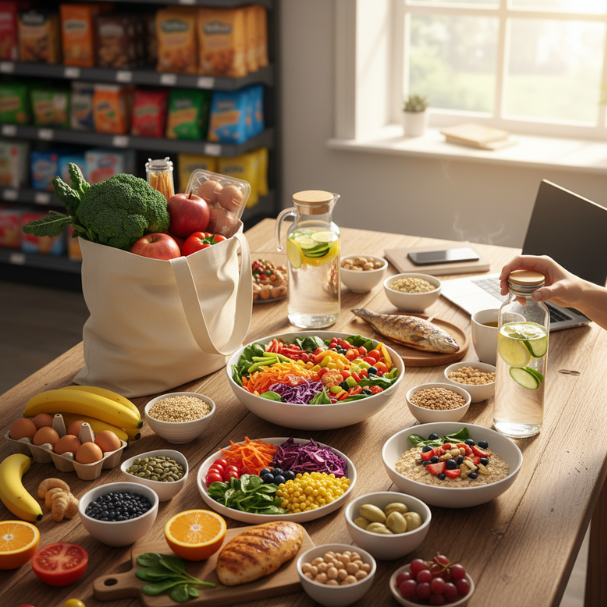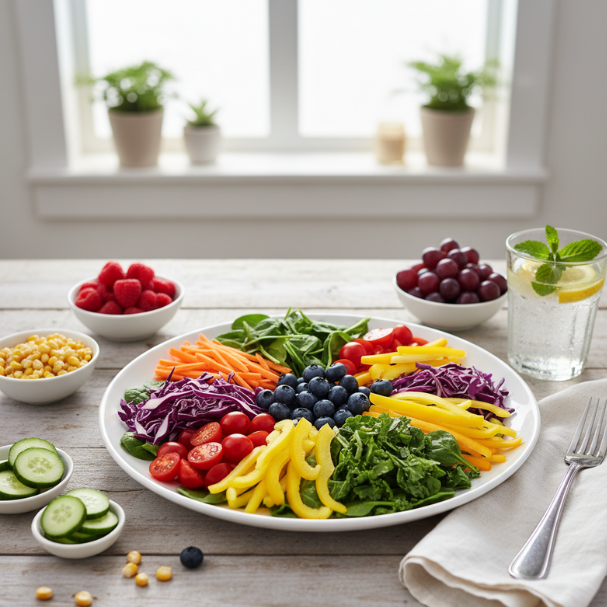Maintaining a balanced diet doesn’t have to be complicated or overwhelming. Often, the biggest improvements to your health and energy levels come from simple, consistent changes in the way you eat every day. Developing healthy eating habits is about creating a lifestyle that fuels your body with the nutrients it needs while still allowing you to enjoy your meals. It’s not about strict rules or depriving yourself of your favorite foods, but about balance, mindfulness, and building sustainable patterns. Whether you want to feel more energized, support your overall well-being, or simply take better care of yourself, starting with small, mindful choices at mealtime can make a big difference. Here are ten healthy eating habits you can begin practicing today.
Prioritize Whole Foods Over Processed Options
One of the most effective ways to improve your diet is to focus on whole foods. Whole foods are those that are minimally processed and as close to their natural state as possible. These include fruits, vegetables, whole grains, legumes, nuts, seeds, lean proteins, and healthy fats.

Processed foods, on the other hand, often contain excess sugar, unhealthy oils, refined grains, and preservatives that do not provide much nutritional value. By choosing whole foods more often, you give your body the vitamins, minerals, fiber, and antioxidants it needs to function at its best. When shopping, aim to fill most of your cart with fresh produce and whole ingredients instead of prepackaged snacks or meals. Cooking at home with whole foods also gives you greater control over what you eat and helps you avoid unnecessary additives.
Eat a Variety of Colors on Your Plate
A colorful plate is often a sign of a balanced meal. Different fruits and vegetables come with unique vitamins, minerals, and phytochemicals that support your health in different ways. For example, leafy greens are rich in iron, calcium, and vitamin K, while orange and red vegetables like carrots and bell peppers are loaded with beta-carotene and vitamin C. Purple and blue foods like berries and eggplant contain antioxidants that may help protect cells from damage. By eating a variety of colors each day, you ensure that you are giving your body a wide range of nutrients. An easy way to do this is to challenge yourself to “eat the rainbow” every day by including at least three to four different colors in your meals.
Practice Mindful Eating

Many people eat on autopilot, whether it’s munching in front of the TV, eating too quickly, or snacking while distracted. Mindful eating helps you slow down, pay attention to your food, and tune in to your body’s hunger and fullness cues. This practice not only improves digestion but also helps you develop a healthier relationship with food. To eat mindfully, try to sit down at a table without distractions, chew your food thoroughly, and savor the flavors and textures. Take a moment to appreciate the meal before you start eating. Being mindful allows you to notice when you are truly hungry versus when you might be eating out of stress, boredom, or habit. Over time, this can lead to more balanced eating patterns.
Stay Hydrated with Water
Hydration plays a major role in your health and even affects how you eat. Sometimes, thirst can be mistaken for hunger, leading to unnecessary snacking. Drinking enough water throughout the day helps regulate your body temperature, support digestion, transport nutrients, and keep your skin healthy. Instead of sugary sodas or artificially sweetened drinks, aim to make water your primary beverage. Herbal teas or infused water with slices of fruit, cucumber, or herbs can add variety without added sugar. A simple way to stay on track is to carry a reusable water bottle and sip regularly throughout the day. Developing this habit ensures that your body stays energized and balanced.
Don’t Skip Breakfast
Breakfast has long been considered an important meal, and for good reason. Starting your day with a nutritious breakfast provides your body with fuel after an overnight fast and sets the tone for healthier choices later in the day. A balanced breakfast should include protein, healthy fats, and complex carbohydrates to keep you satisfied and energized. Examples include oatmeal topped with nuts and fruit, scrambled eggs with vegetables, or whole-grain toast with avocado. Skipping breakfast may lead to energy dips or overeating later in the day, while having a wholesome meal in the morning helps regulate your appetite and supports better focus and productivity.
Control Portion Sizes
Even when you’re eating nutritious foods, portion sizes matter. Eating more than your body needs can lead to sluggishness and discomfort, while eating too little may leave you feeling unsatisfied and more likely to snack excessively later. Learning to recognize proper portion sizes can take practice, but there are simple strategies to help. For example, use smaller plates and bowls to naturally encourage smaller servings, or portion snacks into small containers instead of eating directly from a large bag. Listening to your hunger and fullness signals is also key. Eat until you are comfortably satisfied, not stuffed. Over time, being mindful of portion sizes will help you maintain balanced energy levels throughout the day.
Plan and Prepare Your Meals Ahead of Time

One of the biggest barriers to healthy eating is convenience. When hunger strikes and you don’t have a plan, it’s easy to grab fast food or reach for packaged snacks. Planning and preparing meals ahead of time helps you stay consistent and ensures that you always have nutritious options available. This doesn’t have to mean hours of cooking on the weekend. Simple steps like chopping vegetables in advance, cooking a batch of whole grains, or packing lunches for work can make a huge difference. Meal planning also saves money and reduces food waste because you shop with intention and use what you buy. The more you prepare at home, the easier it becomes to stick to healthy choices.
Snack Smarter with Nutritious Choices
Snacking often gets a bad reputation, but it can actually be a positive habit if done thoughtfully. The key is to choose snacks that are nutrient-dense and satisfying rather than processed foods high in sugar or refined grains. Healthy snack options include fresh fruit, raw vegetables with hummus, Greek yogurt, nuts, seeds, or whole-grain crackers with cheese. These foods provide a good balance of protein, fiber, and healthy fats that keep you full between meals. Having nutritious snacks on hand, whether at home, at work, or while traveling, can prevent you from reaching for less healthy options when hunger hits unexpectedly.
Reduce Added Sugars and Refined Grains

While it’s fine to enjoy sweets occasionally, consuming too much added sugar can disrupt your energy levels and impact your overall health. Foods like soda, candies, pastries, and many packaged snacks contain hidden sugars that don’t offer much nutritional benefit. Similarly, refined grains like white bread and white rice are stripped of fiber and nutrients, leaving you with quick energy spikes followed by crashes. Instead, try to satisfy your sweet tooth with naturally sweet foods like fruit, or choose whole-grain versions of bread, pasta, and rice. Reading labels can also help you identify hidden sugars in foods like sauces, dressings, or cereals. Reducing added sugars and refined grains is not about strict elimination but about making more balanced choices most of the time.
Be Consistent, Not Perfect
Perhaps the most important healthy eating habit is focusing on consistency rather than perfection. It’s normal to enjoy treats, dine out, or indulge occasionally, and doing so doesn’t mean you’ve failed at healthy eating. What matters most is the overall pattern of your food choices. If the majority of your meals are made up of whole, balanced, and nourishing foods, your body will thank you. Developing healthy habits is a journey, and it takes time to create lasting change. Be patient with yourself, celebrate small wins, and remember that progress is more important than perfection. By adopting a balanced mindset, you’ll find that healthy eating becomes more enjoyable and sustainable.
Final Thoughts
Starting healthy eating habits doesn’t require a complete lifestyle overhaul overnight. By making small, consistent changes and building from there, you can create a foundation that supports your long-term well-being. Prioritizing whole foods, practicing mindful eating, staying hydrated, and planning meals ahead are all practical strategies that make a real difference. Remember, the goal is not perfection but balance and consistency. When you approach food with mindfulness and intention, you’ll discover that eating healthily can be both satisfying and enjoyable. These habits are simple enough to start today and powerful enough to transform the way you nourish your body for years to come. The best part is, all you need to do to begin your personalized nutrition journey with Ciranox is fill out the sign-up form and get your subscription—our team will guide you every step of the way toward healthier living.




